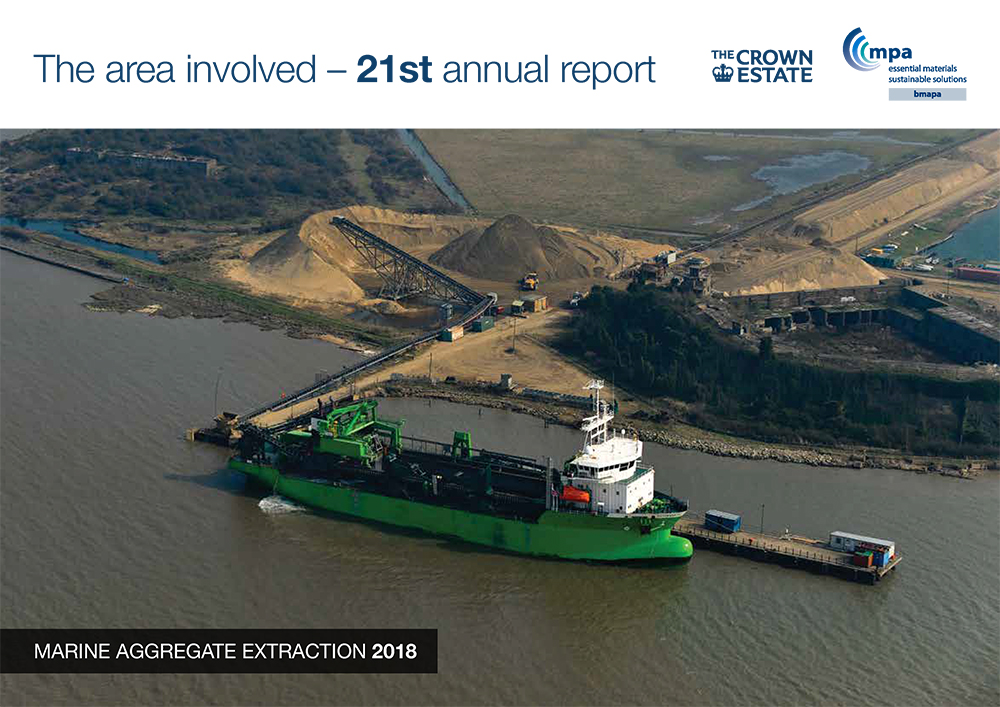
The figures come in a new report from the British Marine Aggregate Producers Association (BMAPA), produced in partnership with The Crown Estate, reporting on the annual area of seabed licensed and dredged.
The report, which presents marine aggregate market and performance data from 2018, details the contribution of marine sand and gravel resources to the overall demand for construction aggregate across England and Wales. The slight increases in landings reported for marine supplies alongside the majority of other sources of construction aggregate, coincide with low levels of growth reported across the economy as a whole.
While reported landings to South East England remained broadly stable, the reduction of overall landings to England and Wales reflected the softening construction market conditions elsewhere. Over the same period, exports of construction aggregate to the near Continent continued to recover in 2018, resulting in a five-year high (4.1 million tonnes).
Other findings in the report include that the total area of seabed licensed in 2018 increased to 1,102km2 (1,057km2 in 2017). Dredging took place within 97.87km2 – 8.88% of the licensed area, compared with 90.94km2 (8.60%) in 2017. The area of seabed dredged for more than 1 hour 15 minutes per year (high intensity – red on charts) decreased to 6.31km2 (7.42km2 in 2017). Ninety per cent of dredging from Crown Estate licences took place from an area of 39.50km2 (38.30km2 in 2017).
The BMAPA has also published a report addressing the sustainable development performance of the marine aggregates sector during 2018. The annual BMAPA Sustainable Development report builds upon the wider sustainable development initiative established by its parent organisation, the Mineral Products Association (MPA). The information reported is structured to align with the existing Key Performance Indicators defined in the original BMAPA Strategy document produced in 2006 with the seven MPA strategic priorities.
Some key points in the sustainability report include that the marine industry remained LTI (lost time injury) free for the duration of 2018, with continued commitment to the wider MPA ‘Safer by Sharing’, ‘Safer by Competence’ and ‘Safer by Leadership’ initiatives.
Both marine aggregate production and total marine gas oil consumption/CO2 emissions reported by BMAPA members reduced slightly during 2018. This overall outcome was a slight increase in the metrics for fuel and emissions per tonne landed (+2.8%).
The latest ‘Area Involved’ report, details changes in the extent of the seabed area licensed and dredged for marine aggregates during 2018. This represents the 21st in an annual series that has been produced following a public statement of intent made by BMAPA and The Crown Estate in March 1999 which committed both parties to reviewing all dredging licences on a rolling five-year basis, surrendering areas no longer containing economic resources of marine sand and gravel, and publishing an annual report detailing the extent of dredging activities within licensed areas.
Mark Russell, executive BMAPA director, said: "Mineral products represent the largest material flow in the UK economy, with the vast majority of supply used in UK construction improving our housing, schools and hospitals alongside the transport, energy and water infrastructure on which society at large is so reliant. Construction, including high-profile infrastructure projects such as HS2, represents a key element of Government's Industrial Strategy aiming to boost productivity and secure sustainable future economic growth particularly in the regions."
He added that marine aggregates make an important contribution to this supply, as well as supporting essential coast protection projects and contributing to the balance of payments through Britain's exports to continental neighbours.
"Our sustainable development report demonstrates the ongoing, real-world impact of the current economic climate on an important industry sector that provides essential construction materials to support future growth, while at the same time highlighting the industry’s continuing steps and progress to improve and enhance its sustainable development credentials," said Russell.
"Meanwhile, the area of seabed licensed and dredged remain key indicators of the UK marine aggregate sector's performance and its potential to interact with both the environment and other marine users. Over the last 21 years, the overall reductions in both reflect an industry sector that is committed to continual improvement."













